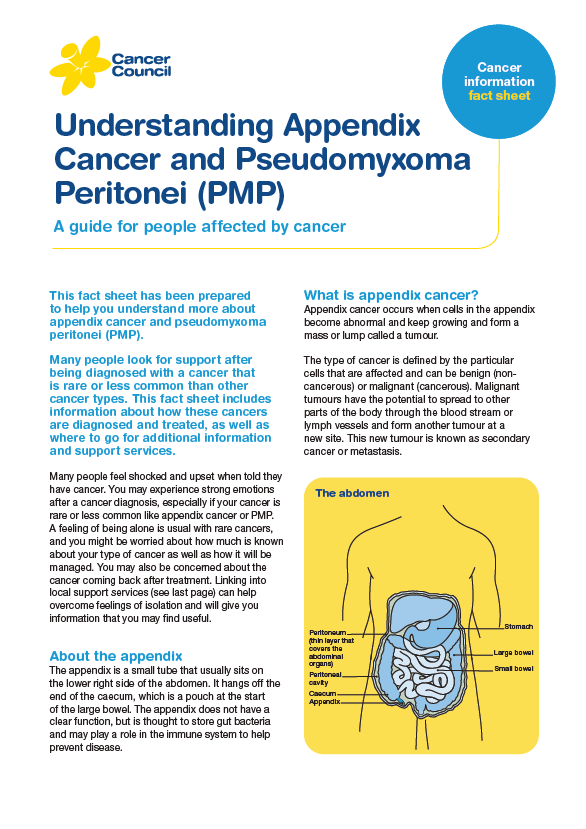- Home
- Appendix cancer and pseudomyxoma peritonei (PMP)
- Life after treatment
Life after treatment
Once your treatment has finished, you will have regular check-ups to confirm that the cancer hasn’t come back. Ongoing surveillance for appendix cancer and PMP involves a schedule of ongoing scans and physical examinations. It’s important to let your doctor know immediately of any health problems between visits.
Learn more about:
Overview
Some cancer centres work with patients to develop a “survivorship care plan” which usually includes a summary of your treatment, sets out a clear schedule for follow-up care, lists any symptoms to watch out for and possible long-term side effects, identifies any medical or psychosocial problems that may develop and suggests ways to adopt a healthy lifestyle going forward. Maintaining a healthy body weight, eating well and being physically active are all important.
If you don’t have a care plan, ask your specialist for a written summary of your cancer and treatment and make sure a copy is given to your GP and other health care providers.
For more on this, see Living well after cancer or call Cancer Council 13 11 20.
Looking after yourself
There is no right way to feel if you have been diagnosed with a cancer such as appendix cancer or PMP. Feeling a range of emotions is normal and you may feel overwhelmed, anxious, fearful, angry, sad or lonely. Many people need emotional support before, during and after treatment. Adjusting to living with visible scars, changes to your physical appearance, changes to your lifestyle and changes to bodily functions can be hard and take time. If this is affecting you or likely to affect you, it’s important to seek help.
It can help to talk things through with a counsellor, psychologist, friend or family member. Talk to your medical team or call Cancer Council 13 11 20 about what support services are available.
For more on this, see Emotions and cancer, listen to this podcast, or call Cancer Council 13 11 20.
Practical and financial support
There are many services that can help you manage with practical or financial issues caused by appendix cancer and PMP. Benefits, pensions and hardship programs can help pay for prescription medicines (for example the Australian Government’s Pharmaceutical Benefits Scheme [PBS]), transport and parking costs or utility bills. Ask the hospital social worker which services are available in your local area and if you are eligible to receive them.
For additional income, you may be able to access your superannuation early in certain circumstances, or claim on insurance policies such as income protection, trauma, and total and permanent disability (TPD).
Managing your ability to work or study, particularly during cancer treatment, is important to consider and will depend on your personal situation.
For more on this, see Cancer and your finances and Cancer, work and you.
If you need legal or financial advice, you should talk to a qualified professional about your situation. Cancer Council offers free legal and financial services in some states and territories for people who can’t afford to pay – call 13 11 20 to ask if you are eligible
If the cancer comes back
For some people appendix cancer and PMP do come back after treatment, which is known as a recurrence. This is most likely to happen within the first five years after treatment. If the cancer does come back, treatment will depend on where the cancer has returned to in your body and may include a mix of surgery, chemotherapy and radiation therapy.
In some cases of advanced cancer, treatment will focus on managing any symptoms, such as pain, loss of appetite and improving your quality of life, without trying to cure the disease. This is called palliative treatment.
Palliative care can be provided in the home, in a hospital, in a palliative care unit or hospice, or in a residential aged care facility. Services vary, because palliative care is different in each state and territory.
When cancer is no longer responding to active treatment, it can be difficult to think about how and where you want to be cared for towards the end of life. However, it’s essential to talk about what you want with your family and health professionals, so they know what is important to you. Your palliative care team can support you in having these conversations.
For more on this, see Palliative care, Living with advanced cancer and Facing end of life or call 13 11 20.
How to eat well after a cancer diagnosis
Why exercise is important after a cancer diagnosis
Why is exercise so important after a cancer diagnosis? Watch this video to find out or watch our Exercise Video Series for a guide of the best exercises for you.
Podcast: Managing Fear
Listen to more episodes from our podcast for people affected by cancer
John Henriksen, Consumer; Prof David Morris, Surgical Oncologist, St George Hospital, Sydney, NSW; Caitriona Nienaber, 13 11 20 Consultant, Cancer Council WA.
View the Cancer Council NSW editorial policy.
